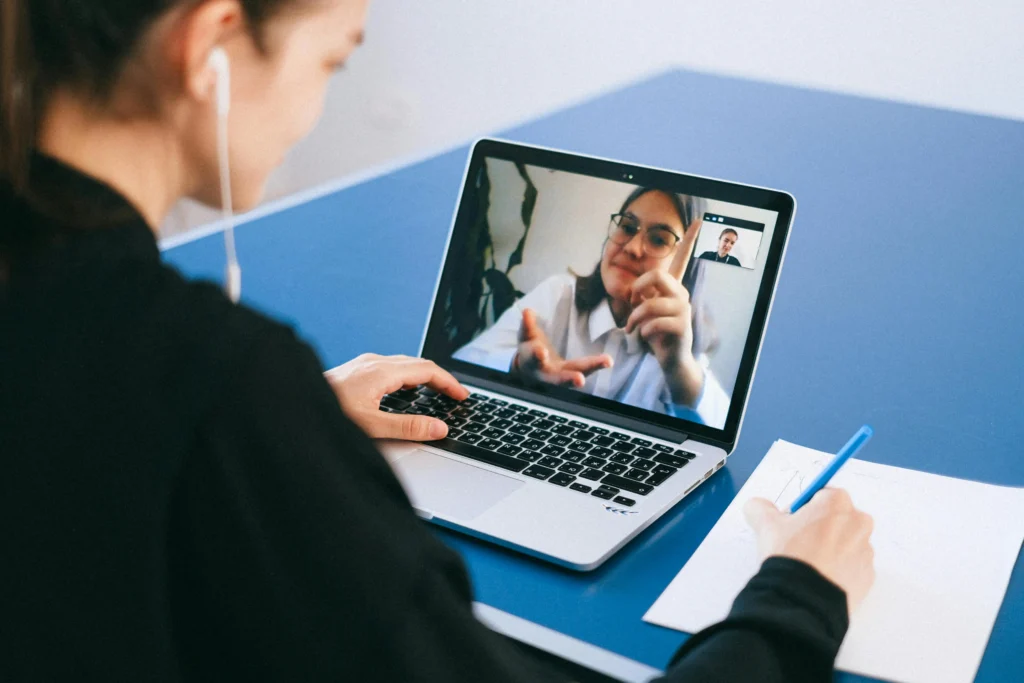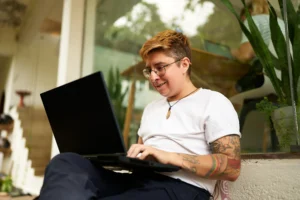Online IOP Mental Health Services
Holistic online mental health IOP services and virtual IOP mental health services for adults and young adults in Arizona.

Virtual IOP for Mental Health
Cornerstone Healing Center offers a Virtual Intensive Outpatient Program, designed to provide comprehensive support, reaching you wherever you are in Arizona. Our online mental health services understand that proper mental health recovery involves healing the whole person—your mind, body, and spirit. We have dedicated master-level clinicians leading the way, using evidence-based online mental health counseling and therapies to help you transform from the inside out. They create customized treatment plans using various proven techniques to unlock your inner strength.
One of the best things about this program is that you can participate in interactive sessions from your home. We’ve created a compassionate framework that provides accountability and routine and encourages you to reflect on your journey authentically. It’s all about balancing evidence-based care and activities that enrich and empower you. But you know what’s even more amazing? This program isn’t just about mental health care and transforming lives. It’s about offering support and building a community there for you every step of the way. Virtual intensive outpatient program (IOP) —virtual health treatment options.
The Mental Health Challenges We Treat with Virtual IOP

In our virtual IOP program for anxiety disorders, we use a comprehensive and evidence-based approach that focuses on our clients as individuals. We understand that every person’s experience with anxiety is different. We combine mindfulness practices and psychoeducation to help clients understand and manage their anxiety symptoms. Through regular virtual group and individual therapy sessions, clients develop new coping methods, improve emotional regulation, and build resilience in a supportive and interactive online environment.
Additionally, our program includes access to various digital resources, ongoing support, and a dedicated wellness coach who works one-on-one to address mental health needs and coordinate medical, life skills, and other resources.

Our virtual IOP treatment for depression prioritizes a comprehensive and evidence-based approach tailored to each client’s unique symptoms and lifestyle. Recognizing that everyone’s journey with depression is different, we integrate mindfulness practices and psychoeducation to help clients comprehend and manage their symptoms. Regular virtual group and individual therapy sessions enable clients to develop effective coping strategies and emotional regulation, fostering resilience.
Additionally, our program offers access to a variety of digital resources, ongoing support, and a dedicated wellness coach who provides individualized care. The coach addresses not only mental health needs but also coordinates medical, life skills, and other critical resources.

In our virtual IOP program for trauma, whether stemming from childhood or adulthood, we implement a comprehensive and evidence-based approach that respects each client’s unique journey. Understanding that each individual’s experience with trauma is distinct, we incorporate mindfulness practices and psychoeducation to assist clients in understanding and managing their trauma-related symptoms. Through regular virtual group and individual therapy sessions, clients develop effective coping mechanisms, improve emotional regulation, and build resilience within a supportive and interactive online environment.

In our virtual IOP program for bipolar disorders, we employ a comprehensive and evidence-based approach tailored to each individual’s unique experience. Acknowledging that every person’s journey with bipolar disorder is distinct, we integrate mindfulness practices and psychoeducation to help clients understand and manage their symptoms.
Regular virtual group and individual therapy sessions enable clients to develop effective coping strategies, enhance emotional regulation, and build resilience within a supportive and interactive online environment.

In our virtual IOP program for obsessive-compulsive disorder (OCD), we offer a personalized and evidence-based approach that respects each client’s unique journey. Recognizing the distinct nature of every individual’s experience with OCD, we combine mindfulness practices and psycho-education to support clients in understanding and managing their symptoms. Through regular virtual group and individual therapy sessions, clients learn effective coping strategies, improve their emotional regulation, and build resilience within a nurturing and interactive online environment.

In our virtual IOP program for obsessive-compulsive disorder (OCD), we offer a personalized and evidence-based approach that respects each client’s unique journey. Recognizing the distinct nature of every individual’s experience with OCD, we combine mindfulness practices and psycho-education to support clients in understanding and managing their symptoms. Through regular virtual group and individual therapy sessions, clients learn effective coping strategies, improve their emotional regulation, and build resilience within a nurturing and interactive online environment.

How We Treat Mental Health Disorders With Virtual IOP
Cornerstone’s online IOP mental health program is designed for Men and Women across Arizona.
Over 8 weeks, you’ll have 9 hours of group therapy and weekly 1-on-1 sessions with a master’s-level clinician, all from the comfort of your home.
Our program provides the support you need to achieve lasting recovery and mental well-being, no matter where you are.
Reach out
Get assessed
Start thriving
Our Simple Process to Get Started
About Our Online Mental Health Services
No Waitlist
Begin our online program for mental health treatment within 24 hours and get matched with a dedicated wellness coach.
Wraparound
Care
Our support goes beyond mental health, we provide wellness coaching, medical treatment, and aftercare.
Proven
Results
Our clients experience twice as much positive change from admission to discharge, compared to other programs.
Wellness
Coaching
Our coaches work closely with you during and after treatment to provide you with life skills, and personalized support.
What to Expect
In Our Online Mental Health Services
Here are the services that we offer our clients when they begin the journey to wellness in our programs.
Virtual Individual Therapy
Virtual Group
Therapy
Life Skills
Groups
Fully Confidential
Care
Immediate
Portal Access
Optional In-Person Meetings
Crisis Intervention Available
Psycho-Educational
Curriculum
Dedicated Personal Wellness Coach

How Are Mental Health Disorders Diagnosed?
Mental health disorders are diagnosed through thorough evaluations conducted by qualified professionals, taking into account various factors, including symptoms, medical history, and behavioral patterns. These disorders can impact your daily life, making things feel overwhelming and challenging.
At Cornerstone, our online mental health counseling is designed to help you understand and manage these issues. With the support of experienced professionals, you can get the care you need from the comfort and convenience of an online platform.

Therapies To Help You Heal
We use Cognitive Behavioral Therapy (CBT) to help change negative thought patterns. By shifting these thoughts, you can improve your emotional well-being. CBT is often used to treat issues like anxiety, depression, and substance use, giving you practical tools to handle tough situations.
We also use Dialectical Behavior Therapy (DBT) to improve emotional regulation and coping skills. It’s especially helpful for managing emotions and improving relationships, offering support for conditions like borderline personality disorder.
Additionally, we empower you to regain control of your mental health through individual online therapy sessions, group classes, and more.
Real-Life Experiences of Healing and Transformation
“I'm eternally grateful for every experience"
J.M.
Cornerstone Alumni
My experience here once I kept an open mind/ open heart, was as honest as possible & willing to do whatever I’m asked of/ can do for others.. I was exactly where I was meant to be. I’m eternally grateful for every experience I’ve had at cornerstone.
“I want to express my heartfelt gratitude”
F.I.
Cornerstone Family
I’m posting this review as a colleague of CHC and as a grateful parent. I’ve always had the utmost respect, not only for the work that CHC has done, but also the culture amongst the organization. Without going into great detail, I just want express my heartfelt gratitude to Estil, Sead and Marcus for going above and beyond with saving the life of a loved one. Your compassion and kindness was the Cornerstone of the foundation in the healing process.
“This place saved my life”
T.W.
Cornerstone Alumni
This place saved my life, the staff are some of the kindest most caring people I have ever met. I definitely struggled at first but once I gave the program my best effort some of the promises are already starting to happen. I am truly grateful for cornerstone healing center I still have a lot of work to do but I definitely learned how to forgive myself and how to love myself and how to be grateful in hard circumstances.
Read from our Testimonials
Cornerstone saved my son’s life! After multiple rehab failures, we were beyond hopeless and miserable. But thanks to a family friend who had major success with Cornerstone, my son decided to try one more time — and this time it worked! My son is now 3+ years clean and sober with a great job he loves and an awesome, happy and successful life!
Cornerstone’s unique approach to treatment plus its amazing, caring professionals and staff really made the difference.
D.L.
Cornerstone Alumni
I’ve never done better in my life than when I’ve been at cornerstone. Excellent iop program. The therapists there are amazing. BHTs are so understanding and actually help with whatever they can. The case management goes beyond just doing their job. Navigation is always there to help and never turns us down. The after care program isn’t like anything I’ve ever been through. I can’t hype this place up any more. If you need help I highly recommend this place. It’s a hard program because we lived a hard life. I can’t be any more appreciative of this place and the people running it. If they gave 10 stars I’d put 10.
R.H.
Cornerstone Family
My experience here once I kept an open mind/ open heart, was as honest as possible& willing to do whatever I’m asked of/ can do for others.. I was exactly where I was meant to be. I’m eternally grateful for every experience I’ve had at cornerstone.
Their PHP and IOP is what I’ve experienced personally but only heard great things about the residential as well!! Very grateful they’re accepting different insurances and the new changes.
J.M.
Cornerstone Alumni
What Are The Most Common Types Of Mental Health Disorders?
Mental health disorders come in various forms, with some of the most common being Anxiety disorders, which involve excessive worry or fear that disrupts daily life.
Depression is another prevalent condition characterized by persistent sadness and a lack of interest in activities. Bipolar disorder involves extreme mood swings, ranging from high energy and euphoria to deep depression.
PTSD, or Post-Traumatic Stress Disorder, occurs after experiencing or witnessing traumatic events and can cause severe anxiety and flashbacks.
Schizophrenia affects thinking, perception, and behavior, often including hallucinations or delusions.
What Causes Mental Health Disorders?
Mental health disorders can arise from a complex interplay of factors. Genetics often play a significant role, with a family history of mental illness increasing the likelihood of developing similar conditions. Environmental factors, such as exposure to trauma, abuse, or significant life stressors, can also trigger or exacerbate mental health issues. Additionally, brain chemistry and imbalances in neurotransmitters can contribute to disorders like depression and anxiety. Lifestyle choices, including substance abuse and poor nutrition, can further impact mental health.
Understanding these causes is important for identifying effective treatment and support strategies to improve mental well-being.
What Online Mental Health Treatment Options Do You Offer?
Therapy plays a foundational role, with Cognitive Behavioral Therapy (CBT) and Dialectical Behavior Therapy (DBT) standing out as particularly effective in addressing various issues.
Medications, such as antidepressants, antianxiety drugs, and mood stabilizers, can help manage symptoms by balancing brain chemistry. Lifestyle changes, including regular exercise, a healthy diet, and sufficient sleep, play a crucial role in maintaining mental health.
Support groups and peer counseling provide additional layers of support and shared experiences. Integrating these treatment options can lead to significant improvements in mental well-being and overall quality of life.
How Effective is Therapy for Mental Health?
Therapy is highly effective in treating mental health disorders, providing individuals with the tools and strategies to manage their symptoms and improve their quality of life. Cognitive Behavioral Therapy (CBT) is particularly successful in helping people identify and change negative thought patterns, while Dialectical Behavior Therapy (DBT) focuses on emotional regulation and interpersonal skills.
What Are The Benefits Of The Virtual Intensive Outpatient Program (VIOP) For Mental Health Treatment?
Our Virtual Intensive Outpatient Program (VIOP) for mental health treatment offers numerous benefits. It provides the flexibility to receive intensive care from the comfort of your home, making it accessible for those with busy schedules or transportation challenges. VIOP combines individual, group, and family therapy, ensuring a comprehensive approach to treatment. Our program utilizes evidence-based therapies like CBT and DBT, helping participants develop effective coping strategies and emotional regulation skills. In addition, the virtual format fosters a supportive community, allowing participants to connect with others facing similar challenges.
All in all, our VIOP offers a convenient, effective, and supportive environment for mental health recovery.
Can I Transition From The VIOP To In-Person Therapy Sessions If Needed?
YES, transitioning from the VIOP to in-person therapy sessions is definitely possible. We understand that your needs may evolve, and we’re dedicated to maintaining continuity of care. If you feel that in-person sessions would be more beneficial at any point, we’ll collaborate with you to ensure a smooth transition. Our goal is to provide the care that best suits your needs and preferences, whether it’s through VIOP, in-person sessions, or a combination of both. We’re here to support you every step of the way.
Together Towards a Healthier Future
Frequently Asked Questions
Knowledge base
Virtual IOP & Substance Use
Take Control of Your Mental Health
Discover personalized virtual strategies and support designed to help you manage your mental health. Don't let mental health challenges hold you back any longer.













